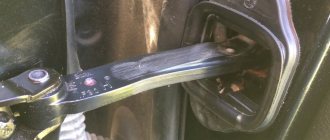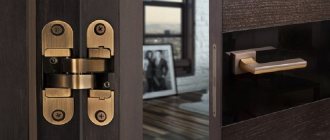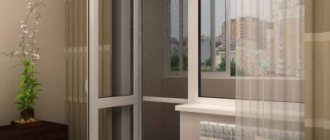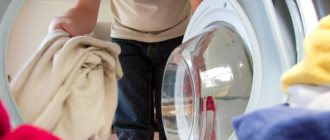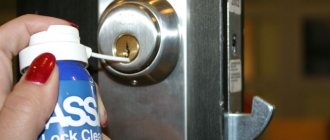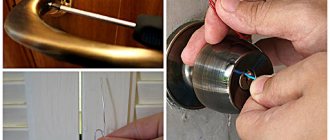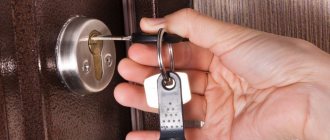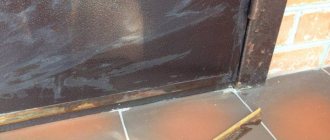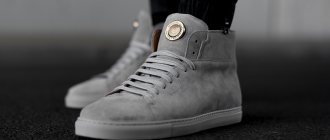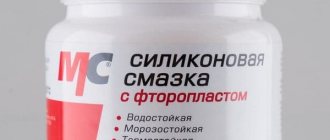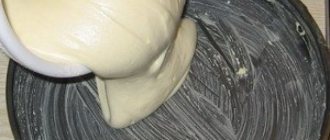Creaking doors can irritate anyone. And people who know understand that an unpleasant sound indicates a malfunction of the mechanisms responsible for the ease of movement of the door leaf, so they immediately begin to think about how to lubricate the door hinges so that they do not become completely unusable. There are many special lubricants on sale, and many substances available in the house are suitable for this purpose. Let's look at their properties and methods of use.
Lubricants Source gorodtlt.ru
Why do doors creak?
As long as the door is working normally, no one thinks about possible problems. But when they appear, the reasons may be different in each specific case. It is necessary to carefully check why the sash cannot open and close silently.
Fastening defects
Installing a leaf in a doorway is not as simple a task as it might seem. Defects that are invisible at first glance turn into a serious problem over time.
Incorrectly selected or secured hinges lead to distortion of the entire structure and accelerated wear of the material. This is where the creaking comes from.
Sometimes the door trim rubs against the protruding parts of the hinges. To fix such problems, you should call a qualified technician. Independent attempts to improve the situation often lead to the opposite result.
Lack of lubrication
During the initial installation of doors, the presence of lubricant is usually checked. However, over time, the lubricant dries out and becomes too thick. It ceases to have the desired effect, and the friction between the parts of the door fastenings increases greatly.
Parts are rubbed, which leads to improper load distribution. At the same time, a creak occurs, and the door itself opens with force, which should not happen in a normal situation. If there is severe wear, the mechanism may become completely blocked.
No balls in loops
Lightweight interior doors can be hung on simple hinges, the design of which does not include bearings or special balls. But ordinary fasteners will not withstand the weight of heavier door panels, for example, metal ones.
If you find that there are no balls in the hinges, you can remove the door from the hinges and put them inside. This will reduce friction and help eliminate the grinding sound.
Garbage has accumulated
Over a long period of use, as well as in dusty rooms, various small debris accumulates inside the hinges. It absorbs lubricant and has an effect similar to abrasive powder. The metal wears off and the hinges begin to creak.
Causes of squeaking
Before choosing a method to effectively get rid of the unpleasant, annoying and frightening sounds made by the door, you need to find the source of the problem. The reason may be:
- Insufficient adherence of fasteners to the jamb, which happens due to violation of installation rules or the use of unsuitable low-quality elements.
- The lining touches the hinges, which, when moving, rub against the material, deforming it.
- No balls in the canopies.
- Lack or complete wear of lubricant in the hinges.
Sometimes dust gets into the joints of moving parts and small debris gets into them. All this absorbs lubricant and acts as an abrasive that grinds down the metal. The only way out is to completely disassemble the elements, clean and lubricate.
Various types of lubricant
Lubricating door hinges is the first thing you can do against annoying squeaking noises. You can use both industrially produced lubricants and improvised home remedies.
But it should be remembered that only properly selected lubricant will have a long-term and effective effect.
Universal means
Well-known and affordable products that are easy to buy in a store or find in your garage:
- WD 40 - comes in a can with a convenient dispenser, allowing you to easily reach hard-to-reach places. A very effective product that cleans the surface and improves the sliding of parts. It works instantly, but not for long. You must use oil afterwards.
- Litol - due to its pronounced water resistance and frost resistance, it is widely used for lubricating entrance doors and gates. Not afraid of adverse weather conditions.
- Solidol is a popular inexpensive product, the effect of which will last for a long time. The reason for this is the thick and viscous consistency of the lubricant.
Machine oil
Ordinary machine oil is a good lubricant for door hinges. Almost every household has a bottle of this technical liquid.
Car owners always have waste - oil left after replacing it in the car with a new one. Oil for engine or car parts is also suitable. It is better to choose one whose viscosity is higher.
Sewing machine oil
Handicraft workers will most likely have oil for sewing machines on their households. A small plastic container with a thin spout will allow you to place a drop of oil exactly where you need it. Sewing machine oil is usually light in color and does not leave a dirty residue.
Vegetable oil
As a last resort, you can take vegetable oil from the kitchen. A short-term effect will be achieved, but some negative consequences are also possible.
Vegetable oil is too liquid, it spreads a lot and dries out quickly. Also, a lot of dust and dirt sticks to it, which leads to wear of the mechanisms. Over time, such oil can darken and thicken, which leads to damage to the fittings.
Pencil lead
An alternative to oil is dry graphite lubricant. The door is lifted and small pieces of pencil lead are placed in the hinges. When opening and closing the door, the stylus crumbles, and the resulting powder prevents squeaking. An easier way to use is to pour crushed stylus into the cracks of the hinges.
Paraffin or wax
Candles made of wax or paraffin are sure to be found in every home. A piece of the substance is heated to a liquid state and buried inside the creaking mechanism. When cooled, the wax hardens and forms a smooth sliding surface.
What types of lubricants should you avoid?
Even if a squeaky door is very annoying, there is no need to try to lubricate it with the first grease you come across. It is highly undesirable to use organic substances - lard, butter and vegetable oil. They contain a large amount of water, which will interact with the metal and cause its slow corrosion.
Over time, this will only make the squeak louder. Also, animal fats quickly decompose, they can even become moldy.
The popular product WD 40 should also be used with caution. It is not so much a lubricant as a washing composition. It cleans the mechanism of dirt, but at the same time washes away the old lubricant. The quick effect of the first application will be replaced by worsening problems. Therefore, after using WD 40, it is recommended to lubricate the hinges with a thicker lubricant.
Mechanics
To eliminate squeaking in the door mechanics, it is worth cleaning and lubricating the components:
- upper and lower hinge;
- lock;
- pens.
After removing old grease and corrosion damage , lubricate all moving parts with fresh grease. In the case of complex components such as security and fire doors, lubrication points are specified in the operating instructions.
Over years of use, the lubricant layer is destroyed, dirt accumulates inside the hinge and wears out the metal. This is a common reason for squeaking.
How to apply lubricant correctly
To ensure that your efforts are not wasted, you need to follow simple rules for applying lubricant. Then the result of the work will be of higher quality and will last longer.
- It is best to apply lubricant using a convenient oil can or from a bottle with a thin nozzle. In case of poor access to the inside of the loops, you can use a syringe or pipette.
- If the door is removed from the hinges, then it is easier to lubricate their open parts with a brush or cotton swab.
- Carefully remove excess grease with absorbent material.
- Worn moving areas need to be treated more carefully. It is very possible that they are the cause of the squeak.
- The rubbing parts are located, as a rule, inside the hinges. You need to try to provide them with a sufficient amount of lubricant.
- Before treatment, all surfaces must be thoroughly cleaned of dirt.
Video instructions on how to properly lubricate hinges.
Solution
There are several reasons why the door fastening mechanism may make an unpleasant noise during operation. Each of them has its own solution.
Lubrication is needed for hinges of both plastic and steel doorsLubrication required . Some types of hinges need to be lubricated from time to time to prevent them from squeaking. Using lubricant, you can eliminate too much friction on the hinge parts, which not only reduces the noise it creates, but also helps extend the life of the product itself. Both a special product intended for this purpose and ordinary machine oil are suitable as a lubricant. In order to lubricate the hinge, it is enough to apply a small amount of lubricant to it, and then repeat the cycle of opening and closing the door several times. Lubricating the hinges is the first method that you should resort to if your door begins to make unpleasant sounds. It is also worth noting that some hinges cannot be lubricated, as they have a closed mechanism that is not accessible.
- Cleaning door hinges . This method should be resorted to if simple lubrication of the hinges does not have the desired effect and the door still continues to creak. It is possible that the reason for this is that during long-term use the hinges have become clogged or rusted. In this case, you may need a special aerosol that can handle both. If the design of the fastening mechanism allows you to remove the door from its hinges in order to clean them more efficiently, you should not neglect this.
- Adjustment .
Another reason why squeaking may occur is poorly adjusted or loose hinges from prolonged use. The difficulty of adjusting the hinges varies depending on their design. As a rule, modern models are quite easy to adjust. How exactly you can read in the instructions. However, if you are not confident in your abilities, it is better to contact a specialist.
Wear . In some cases, the loop simply becomes unusable and then the only solution to the problem is to completely replace the loops. Try to choose hinges only from a reputable manufacturer, this will significantly reduce the risk that the fastening hardware will quickly become unusable.
Lubricating the hinges
You can lubricate the hinges directly on the existing door. But in order to better access the internal surfaces, it is recommended to remove the door.
Without removing the door
If the creaking is light and the mechanisms are not very worn, then it is much easier to lubricate the door without removing it from its hinges. The lower edge of the canvas is raised with the help of a stop, and the upper part of the loop comes out of the socket.
It becomes possible to introduce lubricant inside through the resulting gap. This is done with a syringe without a needle or directly from a can using a narrow nozzle. When finished, you need to open and close the sash several times to make sure the creaking disappears.
It is recommended to cover the surface of the wall and the canvas around the loop with film. Contamination from lubricants is very difficult to wash off.
Taking the door off its hinges
The hinges on the removed door can be subjected to deeper and more thorough processing. To remove the door, you do not need to lift it slightly, but move it upward until the inner parts of the hinges come out of the recesses. Then the rust is removed from the metal and treated with a degreasing compound. The hinges are lubricated over the entire surface with thick grease, and the excess is wiped off with a rag.
Lubricant for hammer drills is considered the most reliable. This treatment will give a durable and stress-resistant result.
Lubrication of various types of doors
Doors vary in purpose, material of manufacture, and design details. Each type has its own lubrication characteristics.
Iron door
The main reasons that an iron door begins to creak are sagging due to heavy weight and metal corrosion. Non-removable welded structures are often found on such doors. In this case, the door has to be lubricated right on the spot. If possible, you need to lift it by sliding some kind of stop down.
The fittings are cleaned of rust and dirt, and a lubricant is applied to those points where friction occurs between moving parts. The leaked lubricant is removed, and the sash is moved several times to distribute the lubricant over the hinges.
Plastic
Plastic doors are usually internal. If such a door leads to the balcony, then lubricate it first from the street side. The door needs to be opened wide and raised slightly. A few drops of oil are applied to the metal hinges, and the blade is returned to its place.
When working with white plastic, care must be taken to ensure that the lubricant does not leave stains. This may not happen immediately, but after prolonged contact of the lubricant with the material. Therefore, it is advisable to make a test on an inconspicuous area of the surface.
Wooden
Lubrication of a wooden door is carried out according to the general scheme. Typically, wooden sashes can be easily removed from their hinges, allowing all surfaces to be thoroughly coated with lubricant. Otherwise, lubricant is introduced into the gaps on the hinges. Natural wood should be protected from contact with grease, as oil can leave a permanent stain.
Glass
Glass doors, despite their airy appearance, weigh quite a lot. Given the fragility of the material, special hinges with rubber gaskets are used when installing them. During installation, the hinges are lubricated with special glue for greater reliability.
All these features, in principle, do not interfere with the lubrication process, but it is better to keep them in mind. Although oil can be removed from glass, it is more practical to use non-residue products, such as WD 40.
Accordion door
Folding doors are usually easy to remove. First of all, you need to clean the wheels and the groove along which they move. Then the wheels are lubricated, not with oil, but with silicone grease. If you use regular greasy lubricants, debris will stick to them, which disrupts the movement of the rollers.
Also, the accordion door has many moving elements that allow it to fold. Due to the design of these elements, they also need to be cleaned and lubricated.
Sliding door
Sliding doors can be noisy and difficult to close due to debris caught in the tracks they slide on. Hard deposits on the wheels and in the recess can be cleaned off with a stiff wire brush. Then the resulting small debris is removed using a vacuum cleaner.
It is recommended to do this regularly. To make the wheels move more easily on the surface, silicone lubricant is applied to them.
What to do if the hinges are rusty and you can’t remove the door
After long-term use of a hinge or several hinges that are used outdoors, situations often arise when it is impossible to remove the door leaf. The hinge becomes covered with rust, which interferes with the normal operation of the mechanism and disassembly of the device. In this situation, it is recommended to use rust dissolving agents.
When purchasing a spray or aerosol (as in the picture), the product is sprayed onto the surface of the loop. If a liquid oil composition is chosen as a solvent, then a compress should be applied to the loop: the composition is applied to a rag, which is applied to the loop.
It will take 3 to 6 hours for the softening composition to fully interact with rust. Thus, there are a lot of products for lubricating door hinges and locks. The compositions can be purchased freely. Door hinges should be lubricated regularly. This affects the service life of the mechanism.
Sources:
- https://www.mnkk.ru/info/kak_samostoyatelno_smazat_petli_stalnih_i_plastikovih_dverey_poshagovaya_instruktsiya/
- https://torex.ru/doors/articles/skripit-vkhodnaya-dver-chto-delat/
- https://sdf-handle.ru/poleznaja-informacija/chto-delat-esli-skripit-dver/
- https://hozsoveti.ru/sovet/smazat-dver-ne-skripela
- https://goodykitchen.ru/kak-smazat-dvernye-petli-ne-snimaya-dver-2-osnovnyx-sposoba.html
Lubricating door parts
Fittings parts can have different types of design. In accordance with the design of the mechanism, you need to choose a method for lubricating it.
How to lubricate hinges
Hinges are often one-piece. A door with such hinges can only be dismantled by unscrewing all the screws. Such loops consist of a large number of elements. Therefore, they have many rubbing surfaces that regularly need lubrication.
Despite the difficulties in care, these loops are very popular. They are universal and suitable for both right- and left-handed doors.
Awnings
Detachable hinges, or canopies, in the simplest case consist of two parts. The door can be easily removed without unscrewing the hinges. If the awnings are very rusty, you need to put a rag soaked in machine oil on them and leave it for several hours. After this, the oxide is easier to clean. Finally, the metal is lubricated and the door is hung in place.
Guides
Before lubricating the guides, they must be cleaned. Only after making sure that dirt does not interfere with the movement of the valves can you apply silicone grease.
Stuck pin
Soak rusty hinges with WD - 40 spray If you cannot remove the hinge pin, spray it with a small amount of penetrating lubricant spray for up to 12 hours before attempting to remove it. Spray and let it sit.
Many people start to push it out with a hammer if it is very rusty. This can damage the wood of the door, break the hinge, and require more repair work.
Gently tap the end of the pin with a screwdriver. Use the end of a screwdriver to push the pin through the hinge, gently pushing it out. This is an effective way to remove the pin from the joint to lubricate it.
Even an ink pen or other small-sized object is suitable for this work.
Repair the pin if necessary. Turn your finger on a flat surface. Inspect the pin for deformation and signs of wear. If it's rusty and bent, then it's worth spending a little time fixing and cleaning it before reinstalling it to avoid door squeaks in the future.
- If it is bent, straighten it by laying it on the cement floor and tapping it with a hammer to bend it back into shape.
- Use sanding cloth to sand and remove rust. This will help secure the pin more loosely, creating less resistance and less potential for squeaking.resistance and less potential for squeaking.
Preventative door care
If you properly care for interior and exterior doors, the problem of squeaking simply will not arise. Recommended:
- regularly lubricate the hinges;
- tighten the mounting screws;
- Avoid high humidity in the room.
To prevent door squeaks from disturbing the peace of people in the house, you need to take care of the doors and take care of their condition. If you hear an unpleasant sound every time you open and close the door, it’s time to pick up an oil can. A few quick, simple movements, and comfortable silence reigns again. In order for the result to last for a long time, the door will have to be removed from its hinges and the rubbing parts subjected to more serious processing.
When do you need to lubricate car door hinges?
As a rule, if a car door squeaks, it is important to figure out the reasons for the squeak, as well as how to lubricate the car door hinges. First of all, the door hinges themselves experience greater loads compared to a regular door in the house.
At the same time, the driver's door opens much more often than other doors in the car. Often it is she who starts to creak first. However, it also happens that creaking suddenly appears on the least loaded doors (for example, the rear ones).
One way or another, it should be taken into account that the lubricant for car door hinges under conditions of such loads and aggressive environments is used, washed off, loses its properties, becomes actively contaminated, etc.
It is for this reason that it is optimal to regularly lubricate the hinges in your car, regardless of whether there is a squeak or not. Renewing the lubricant even periodically often allows you to get rid of extraneous sounds, and also ensures the ease and smooth operation of the hinges themselves.
Let's move on. If a car door starts to creak, what to do in such a situation will be determined by the condition of the hinge itself. Traces of severe corrosion, cracks, or destruction of the elements securing the hinge may be the basis for a complete replacement of the part or attempts to carry out repairs (for example, welding the hinge).
In cases where no critical damage is identified, only adjustment and lubrication may be required. At the same time, it is a mistake to believe that the hinges in a car can be lubricated with anything.
It should be taken into account that the lubricant must have high penetrating ability, protect against corrosion, form a sufficient protective layer, not lose its properties in conditions of high humidity, remain on the surface in severe frosts or extreme heat, etc.
It is important that the composition can penetrate into the gaps between the rubbing parts of the loop and create a film there to avoid dry friction. At the same time, the product must be durable, not aggressive to rubber and plastic parts, not damage the car’s paintwork, etc. . These are the requirements that are put forward if you need lubricant for car locks, lubricant for car doors or hood/trunk hinges, lubricant for seals and other elements. In all cases, a high-quality lubricant includes additives, thickeners, as well as the lubricant base itself
These are the requirements that are put forward if you need lubricant for car locks, lubricant for car doors or hood/trunk hinges, lubricant for seals and other elements. In all cases, a high-quality lubricant includes additives, thickeners, as well as the lubricant base itself.
Just some twenty years ago, a variety of available means were used as lubricants, including kerosene, acetic acid, and even iodine, which is found in every first aid kit. But those times are far behind us, and today the choice of special chemicals is quite wide. Let us consider what properties they should have for each element separately.
Lubricants for locks should not be afraid of low temperatures, have excellent anti-corrosion properties and a minimum coefficient of friction
It is also very important that they are resistant to washing off, do not separate with subsequent oily discharge and, of course, have a long-lasting effect. Also, despite the fact that today there are many options for lubricating car doors, you need to choose a product based not on pricing policy, but on the quality of the product
Hinge lubrication
To do this, you need to wipe the parts with alcohol or gasoline, and then apply a consistent composition - litol or grease. Their advantage is their thick consistency, which does not lose its performance characteristics even in the heat. Also, due to their special structure, these products repel moisture, preventing it from entering the mechanism.
If earlier car service technicians used ordinary soap to lubricate door elements, now specialized products are made to “treat” creaking locks and hinges. Many of them contain Teflon.
Such coatings have the consistency of dry soap, and due to the absence of a greasy film, they resist the adhesion of sand, dirt, and dust. The only drawback of Teflon auto lubricants is their price. But the high cost is compensated by a long service life - about two years. Although soap protects mechanisms about the same - 1-2 years.
The answer is simple: after washing, for example, with Karcher and before winter, when the risk of acquiring an irritant in the form of a creaking door increases. In this case, lubricating the door locks and hinges of the car is simply necessary!
